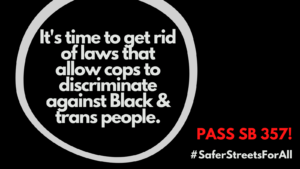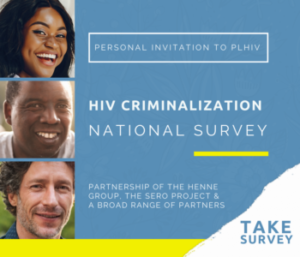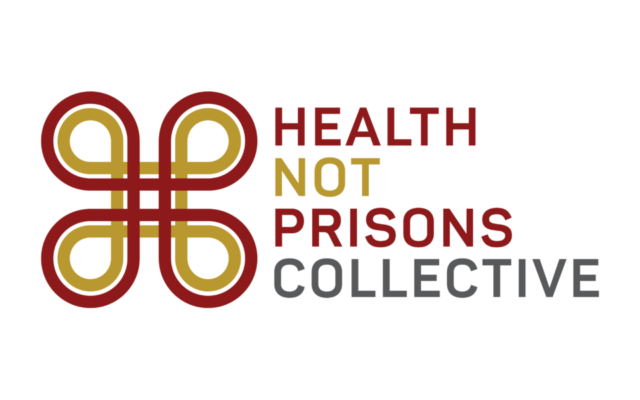Health Not Prisons Dispatch: September & October 2021
The Health Not Prisons (HNP) Dispatch is a monthly* bulletin highlighting recent developments relevant to criminalization and policing of people living with HIV in the United States, along with upcoming events, relevant resources, and opportunities to get involved.
HNP prioritizes authentic engagement, activation, training, and leadership rooted in our principles and deep investment in our communities. To that end, we want to hear from you! For more information about the coalition, ways to get involved, or efforts you would like to see the Collective support, email Tyler Barbarin at [email protected].
*Due to Hurricane Ida’s impacts on staff based in the South, we have combined the newsletters for the months of September and October. We will return to monthly newsletters in November.
National Updates
Molecular HIV Surveillance (MHS) is the use of data collected during routine drug resistance testing to compare HIV genetic sequences, determine if they are related, and thus identify HIV “risk networks”, as defined here by the Center for Disease Control. For years, people living with HIV have raised concerns with MHS because it denies people living with HIV our agency, privacy, and bodily autonomy. MHS is yet another means through which marginalized communities, like sex workers, people who use drugs, Black and Latinx gay and bisexual men can be placed at risk for criminalization.
Both federal HIV plans, Ending the HIV Epidemic (EHE) and the HIV National Strategic Plan (HNSP), incorporate MHS as a cornerstone to the HIV response and have tied HIV prevention funding to the implementation of MHS in all jurisdictions… But for years, networks of people living with HIV, including members of HNP, have been vocal about the ways MHS presents a potential for serious harm to the health and safety of communities most impacted by the epidemic. Concerns raised by community advocates include the lack of informed consent for data collection, perpetuating distrust of public health and medical institutions, and lack of consistent protection and privacy laws to protect from the use of molecular HIV data in criminal or civil proceedings.
HNP partners have provided comments raising these concerns to federal advisory bodies including The Presidential Advisory Council on HIV/AIDS (PACHA), the CDC/HRSA Advisory Committee (CHAC), and federal agencies including the National Institutes of Health (NIH) and the Department of Health and Human Services.
Recently, the Center for HIV Law and Policy, Positive Women’s Network-USA, and the U.S. People Living with HIV Caucus submitted a joint comment in response to the NIH’s Request for Information on Developing Consent Language for Future Use of Data and Biospecimens, highlighting the need for informed consent, data privacy laws, and strong security protections when dealing with sensitive HIV data and private health information.. Read the entire comment, here.
In a recent interview, Tracked and Monitored: Advocates Call for a Moratorium on Molecular HIV Surveillance, Andrew Spieldenner, vice-chair of the U.S. Caucus of People Living with HIV, and Naina Khanna, Co-Executive Director of Positive Women’s Network-USA, summarized apprehension about the rollout and expansion of MHS, stating “The bottom line is we’re talking about extremely sensitive data, that is private, confidential information about people who are living with an illness that can be criminalized, that is certainly stigmatized, and that can place them at risk for violence—whether it’s interpersonal violence, or discrimination…or violence from the state.”
Privacy, autonomy, and humanity are intertwined in the ways HIV data is collected, monitored, and shared. Spieldenner stated, “As people living with HIV, we have been targets and the objects of HIV surveillance since our diagnosis. And we really want to be able to talk about the embodied experiences of what happens when your body becomes, and your community becomes, tracked, monitored, and intervened on by state apparatuses.”
HNP will continue to advocate that reservations about MHS are taken seriously and that demands for HIV data privacy laws and HIV decriminalization are addressed in current and future iterations of the National HIV/AIDS Strategy and the Ending the HIV Epidemic Plan.
Decriminalization Efforts at the State Level
Pennsylvania
The PA House Democratic Policy Committee hosted a briefing on October 6th on Decriminalizing HIV, hosted by Representative Malcolm Kenyatta and Chairman Ryan Bizarro. Powerful first-person testimony was provided by PWN members Julie Graham, a survivor of HIV criminalization, and Michelle Troxell, co-chair of PWN’s Pennsylvania chapter, highlighting how HIV criminalization laws undermine public health and fuel stigma. Adrian Shanker, executive director of the Bradbury-Sullivan LGBT Community Center, and Steven Bryson, SERO Legal Fellow at the AIDS Law Project of Pennsylvania also testified, providing data and additional context on the importance of eliminating laws that criminalize people living with HIV.
Although there are no HIV-specific criminal laws currently on the books in Pennsylvania, people with HIV in PA have been criminalized under general communicable disease statutes. Legislation increasing the criminalization of people with HIV was introduced and stalled as recently as the 2021 legislative session, as with House Bill 103 and House Bill 1835. HNP hopes to see increased commitments from Pennsylvania lawmakers to decriminalize HIV and communities most impacted by the epidemic, and increased collaboration with HIV advocates across the state. The full recording, agenda, and written testimony are available here.
Tennessee
The Tennessee HIV Modernization Coalition held their first town hall to discuss HIV modernization in the state and House Bill 1599 on September 28th. Panelists included Marye E. Bernard from the American Academy of HIV Medicine (AAHIVM); Marshe D. Turner, AAHIVM; Amber Coyne, End the Syndemic Tennessee Coordinator and several survivors of HIV criminalization. The Sero Project continues to support the efforts of the advocates in Tennessee to modernize the state’s HIV laws. Learn more about the Tennessee HIV Modernization Coalition and register for the next upcoming town hall on October 26th, here.
California
Decriminalizing sex work: Decrim Sex Work California has successfully moved a bill through both chambers that repeals “intent to commit prostitution” laws, known colloquially as “walking while trans” laws because they disproportionately target and harm Black and brown transgender and gender diverse people.
Sponsored by Senator Weiner, Senate Bill 357 (SB 357) currently awaits Governor Newsom’s signature. HNP extends congratulations to Decrim Sex Work Califonia, a coalition that includes the ACLU of Southern California, St. John’s Infirmary, sex workers, and all advocates and organizers in California that have worked tirelessly to make this win a reality.

Harm Reduction: Governor Newsom has signed Assembly Bill 1344 (AB 1344), which would strengthen protections for syringe access programs and increase access to safe and affirming healthcare for people who use drugs into law. We congratulate the activists and advocates in California that worked to expand harm reduction possibilities in the state and thank Governor Newsom for enacting this critical piece of legislation.
Partner Highlight of the Month

The Sero Project launched the National Survey to Assess Attitudes on HIV Criminalization Among PLHIV. This survey aims to understand how people living with HIV understand HIV criminalization laws and how they are impacted by criminalization laws.
As federal and state HIV decriminalization efforts continue, it is imperative that there is data collected from people living with HIV. This is a request coming directly from people living with HIV: to speak up about the impacts of HIV criminalization on the lives of real people, as articulated in this recent article by The Body.
Resources
Read
- The Journal of AIDS and Behavior published an article urging faith-based organizations to act justly and fairly as they provide services to people living with HIV. The article also discussed ways organizations of faith can support the Ending the HIV Epidemic Plan. Read the article here.
- The Conversation published an article discussing the state of HIV criminalization laws in the 37 states that still have laws on the books. Read the article here.
- The U.S. Supreme Court refused to hear a case challenging the constitutionality of Lousiana’s sex offender registry, specifically marking an individual’s driver’s license. This is a huge win for HIV decriminalization advocates since LA’s HIV criminalization laws require those charged under it to register as sex offenders and mark their driver’s licenses. Read more about the case here.
Watch
- The Counter Narrative Project participated in The Elizabeth Taylor AIDS Foundation Satellite Session, “Storytelling to Change Laws & Fight Stigma”. This session discussed how storytelling impacts the efforts to modernize HIV laws and challenge the stigma surrounding HIV. Watch the discussion here.
- The Counter Narrative Project hosted a roundtable discussion about the latest efforts to modernize HIV criminalization laws around the country. Watch Facebook live here.
- The Sero Project hosted the first webinar in the “Road to HINAC5 series”, Breast Feeding and HIV in the U=U Era Advancing Conversation and Community Awareness. Watch it here.
- The Sero Project hosted a panel discussion on building a network of HIV decriminalization advocates across the midwest to support advocates and HIV modernization efforts. Watch HIV Across the Heartland, here.
- The Ohio Health Modernization Movement has released a series of talks that explore the intersection of faith and HIV decriminalization from multiple angles. Most recently, they released a talk about the intersection of COVID-19, HIV stigma, and faith. Watch the video here.
- The Ohio Health Modernization Movement discussed the intersection of HIV criminalization and sex work criminalization in a panel discussion, linked here.
Register
- The HIV Justice Now! Coalition and Funders Concerned About AIDS are hosting a webinar to present on the racial justice guiding principles for HIV philanthropy. The event will be hosted on October 12th, 2021. Register to attend, here.
- The Thera Project is hosting a discussion to talk about the impact of HIV criminalization laws on people living with HIV. Join this discussion to learn about the history of HIV criminalization, the lived experiences of people living with HIV, and the recent reform efforts. Register for the conversation on October 8th here.



